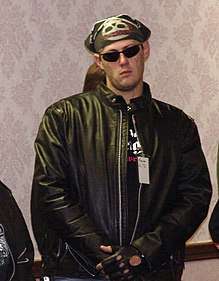Mind's Eye Theatre
Mind's Eye Theatre is a live action role-playing game based on the White Wolf World of Darkness universe, sharing a theme and setting originally with the table-top role-playing game Vampire: The Masquerade and with two revisions, Vampire: The Requiem and Mind's Eye Theater: Vampire The Masquerade. (The rules for Mind's Eye Theatre have likewise been revised.) Other games or "venues" include: Werewolf: The Forsaken, Mage: The Awakening, Changeling: The Lost and more.
| Designer(s) | oWoD: Mark Rein·Hagen, Graeme Davis, Tom Dowd, Chris Cowart, Don Bassingthwaite, S. P. Somtow, Ken Cliffe nWoD: Peter Woodworth cWoD: Jason Andrew, Jason Carl, Kevin Millard, Jennifer Smith, Ree Soesbee |
|---|---|
| Publisher(s) | White Wolf, By Night Studios |
| Publication date | 1993, 2005 (nWoD), 2013 |
| Genre(s) | live action role-playing game |

Conflicts and skill challenges are settled in the first and current editions with a "rock paper scissors" system often referred to as "throwing chops" or "hand jamming". The 2005 Mind's Eye Theatre system, however, used a random card-draw mechanic. Every player carried a deck of ten playing cards (2-10, plus an Ace), and added a skill modifier to their draw.
The game possesses many rules both for game play and player safety. Some groups, however, use the game as background material, while using home-grown sets of rules for their actual game-play.
In 1999 Pyramid magazine named Mind's Eye Theatre (the original version) as one of the Millennium's Best Games. Editor Scott Haring said "Mind's Eye Theater was the first to take an established pen-and-paper RPG and do the translation to live-action. And it is easily the most successful live-action game, too."[1]
Publications
- Mark Rein-Hagen, Ian Lemke et Mike Tinney, The Masquerade, 1993, 2nd ed. 1994
- Richard E Dansky, Beth Fischi, et al., Laws of the night, 1996
- Mind's Eye Theatre (July 2005) Core Rulebook
- Mind's Eye Theatre: The Requiem (July 2005)
- Mind's Eye Theatre: The Awakening (August 2007)
- Mind's Eye Theater: Vampire The Masquerade (December 2013)
- City in the Sand (PDF Only)* (July 2009)
- Laws of the Night (1997) (formerly Masquerade; based on Vampire: The Masquerade)
- Laws of the Wild (formerly Apocalypse; based on Werewolf: The Apocalypse)
- Oblivion (based on Wraith: The Oblivion)
- Laws of the Hunt (focusing on mortals as characters)
- The Long Night (based on Vampire: The Dark Ages)
- The Shining Host (based on Changeling: The Dreaming)
- Laws of the Wyld West (based on Werewolf: The Wild West)
- Laws of Ascension (based on Mage: The Ascension)
- Laws of the Reckoning (based on Hunter: The Reckoning)
- Laws of Resurrection (based on Mummy: The Resurrection)
- Laws of the East (based on Kindred of the East)
- Faith and Fire (based on Dark Ages: Vampire)
- Vampire by Gaslight (based on Victorian Age: Vampire)
* Storytelling Adventure System
References
- Haring, Scott D. (1999-12-24). "Second Sight: The Millennium's Best "Other" Game and The Millennium's Most Influential Person". Pyramid (online). Retrieved 2008-02-16.